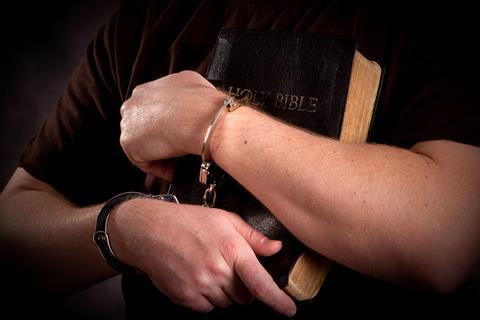Working as a prison chaplain is sometimes funny, sometimes sad and often challenging. But it has taught Rev Hilary Edgerton more about grace than she ever thought possible

The random conversations that take place in our prison are sometimes humorous, sometimes irritating, sometimes banal, sometimes moving and sometimes odd. Sometimes, they are all of the above.
Often, as chaplains, we get requests that are nothing to do with us. If one department hasn’t given a prisoner what they want, they try the chaplain, because we’re supposed to “be nice”’ and help people.
The whole of life is here in this prison. From the art group, which is therapy to men who never thought they had a talent, to the shop-fitting workshop and horticulture teams, there are efforts to help men grow used to the idea of work. It’s a tough challenge. Some can be manipulative, conniving, aggressive, unpleasant and impatient.
At times, so can I.
This is not about brushing offences under the carpet and pretending they never happened
After a brief encounter with prison chaplaincy during my curacy, this is a world I never thought I’d see again. I can still recall choking back tears as I listened to a young inmate singing “Do not be afraid / for I have redeemed you” at an Easter service. I saw the deep value in the work, but felt out of my comfort zone. I thought it was a good experience, but probably not for me.
Fast forward 20 years, and a combination of circumstances and a sermon I heard compelled me to apply for the prison job I now hold. Perhaps it’s taken me all those years to have the character needed to make a better fist of it.
I have a heart for these men who’ve lost their way, grown up in awful circumstances and never learnt a different way to be or the means to cope with the rubbish life throws at you. Listening is something Jesus did a lot of, yet he never left it there. There would be action or challenge, healing and straight talking.
In at the deep end
I’ve run Christian foundation courses many times. Currently I’m facing the most challenging group yet. One man wants to know how to be a born-again Christian; another said: “God told me to come to chapel more” but added that he thought the Bible was made up. Another is a beginner in terms of faith and wants to learn; the next takes the bits he likes from Buddhism, Roman Catholicism and Hinduism, has been a member of a Jewish commune, attended a Church of England church and recently declared he was “blown away” by reading about Krishna.
I’m in the deep end, but it’s nothing if not stimulating.
We held a pretty good discussion about Jesus, why he died, sin, forgiveness and character. People talked about stories of forgiveness. But then Joe* stated firmly: “I’ll never forgive the bloke who put me in here.” It’s not the first time my heart has sunk after the central message of Christian faith - forgiveness - has been intellectually explored and then utterly rejected.
Of course, Joe was not put in prison by anyone other than himself, for the crime he committed. Yet he claimed that what he did was in response to aggravation and was justified. We talked around the subject.
I told the story of Corrie Ten Boom, a Dutch Christian famous for hiding Jews during the Holocaust. After surviving the Nazi concentration camps, years later, she came face to face with a former camp guard who asked for forgiveness. She wrote of the struggle to do what she had spoken of many times and look into his face with mercy. Yet she did it.
I suggested to Joe that if he couldn’t forgive, he might at least pray for the desire to forgive, and gave him a book called Why Forgive? (Plough Publishing House). Two days later he told me, casually, that he’d started it, and decided to pray for that desire.
When we next met, he said: “Everywhere I look I’m seeing that word ‘Forgiveness’”. He paused for a moment. “I’m just going to have to do it, Miss, aren’t I? When I get out - shake his hand and move on.”
There’s a long road to travel before that may happen, but it was a sign of hope.
Past trauma
Meanwhile, I’ve forgiven the man who was desperate for bereavement counselling but failed to turn up for his appointment or ask someone to let me know he felt unwell and had decided to stay in bed instead.
It wasn’t, comparatively speaking, too difficult, especially given the story of the abusive childhood that Martin* told me earlier that day. The lighting of a candle for his grandmother who is dying turned into a self-revelation with more detail than I’d really like.
He, too, does not want to be saddled with hate and is aiming to do the forgiveness thing bit by bit, piece by little piece. Truly, if it happens, it will be a miraculous work of grace.
I’m in the deep end, but it’s nothing if not stimulating
I asked another inmate, Shaun*, if he had a dream for his life. “Just to one day have my own house and maybe a wife.” I suggested that a job might help, too, and he smilingly agreed.
Shaun had spent several days in prison in a terrible state, not speaking, staring, banging his head, jumping on his bed and other things that are unmentionable in a piece like this. The mental health team tried various interventions and, eventually, Shaun began to engage with life again.
He was 14 when he first entered a Young Offenders’ Institution after committing a crime that he says goes back to childhood trauma. Released at 16, he found a girlfriend, had a baby and, eleven months later, was back in prison where he’s been ever since. He’s still only 30 years old.
How do you start to unpick that kind of a past and tell him he can dream of something better? How do you learn life in what must seem like a different country?
Fair judgement
There’s a story in the Bible where a few religious types condemn a woman caught ‘in the act’ of adultery to death by stoning. “Let any one of you who is without sin be the first to throw a stone at her” (John 8:7), said Jesus.
So now, when I hear comments on the news or in the street about the guilt of prisoners, while I cannot condone the crimes, I am slower to condemn the person.
“It was three minutes that changed my life,” said the one who finished telling me about his travels abroad and his university course, left incomplete. He had gone home for the holidays, got into an argument and hit someone. The rest, as they say, is history.
Martin told me how he was shocked to realise he had become a “career criminal”. He hated prison but, once outside, he would find himself forgetting the misery of it and fall back into the old ways that he had been taught since childhood.
John* had sold drugs to get money for his family since he was small; Aidan* robbed someone because his mates made it clear that the gang couldn’t cope with ‘losers’ and he feared for his life.
Jesus was the ultimate judge of the woman who lay on the ground before the jury who knew exactly what she deserved. When they had turned tail, he told her that if there was no one left to condemn her, he would not either. Then he made it clear that she must leave her life of sin.
Listening is something Jesus did a lot of, yet he never left it there
This is not about brushing offences under the carpet and pretending they never happened. Sometimes, punishment is needed - along with every effort to get people onto a new track. Yet, in the middle of it, let’s not forget that, born in a different time, a different place, with different family – or simply caught in a moment of angry frustration - it could be me; it could be you.
In the prison chapel, during the sharing of The Peace, I think of the wounded hands of Jesus as he offered peace to his deeply flawed disciples after his resurrection. I shake the sweaty hand of the man who has social phobias and poor personal hygiene; the man who killed another human being when he was depressed, and the one who has PTSD after his time in the military. I shake the hands of the drug addict and the thief who is funny and loves his mum; the hands of the one who worries about his children and the one recently bereaved and who was unable to go to the funeral.
This is my congregation. They are, in truth, my brothers, though they have lived a life which is a million miles from my own. They are deeply flawed human beings. They are also loved by God, and so I must love them too.
*Names have been changed


































